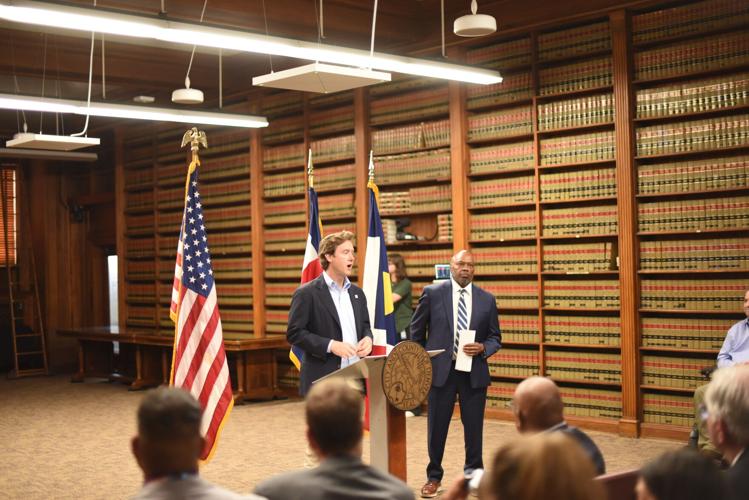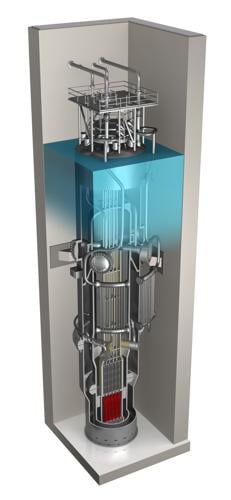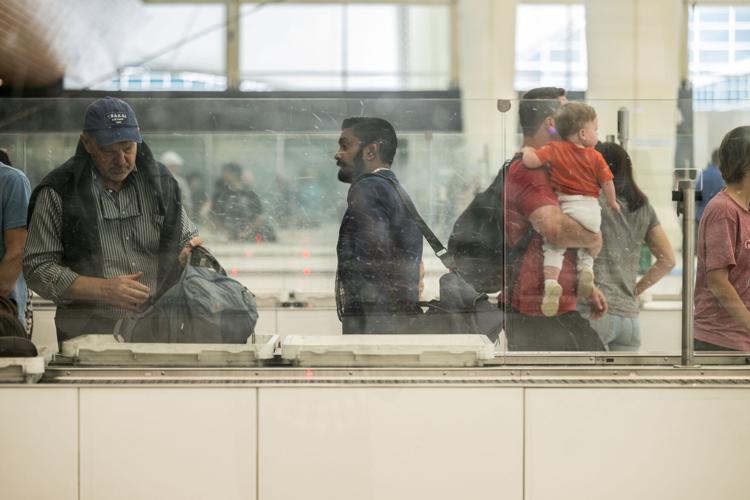Is proposal to study nuclear power at DIA off the table?

Denver Mayor Mike Johnston speaks in the Parr-Widener Community Room in the Denver City and County Building during the news conference about Denver International Airport soliciting a feasibility study for the implementation of a modular nuclear reactor at the airport on Wednesday, Aug 6, 2025. (Michael Braithwaite / The Denver Gazette)
Michael Braithwaite / The Denver Gazette
Are efforts by Colorado’s biggest airport to study the feasibility of powering its operations with nuclear energy off the table?
A councilmember last week suggested that Denver International Airport pulled a request for proposal to study the possibility of building a small modular nuclear reactor power station on its 34,000-acre campus to meet its expected future power needs independently, as authorities anticipate the airport serving 120 million passengers by 2045.
“Denver International Airport removed the request for proposals for a feasibility study for a small nuclear reactor out at Denver International Airport,” Denver City Councilmember Stacie Gilmore said at Monday’s meeting of the Denver City Council.
Gilmore, who represents the airport area, said there had been no conversations between herself — or the council — and airport authorities and the idea’s proponents, who include Denver Mayor Mike Johnston.
Airport CEO Phil Washington told the Transportation and Infrastructure Committee of the Denver City Council that the RFP was issued at about 8 a.m., just before the meeting began.
A statement from the airport media team received Monday evening said, “The Small Modular Reactor (SMR) Feasibility Study Request for Proposal was delayed, effective Friday, Aug. 8. The delay will allow DEN the opportunity to provide an overview of the proposal to the community in District 11 and beyond. Our goal is to present this idea to the community, listen to their feedback, and understand what they would like to see included in the feasibility study.”
“I appreciate Denver International Airport for removing that RFP until there can be authentic outreach with my constituents, to hear from them about their life and safety, especially next to their single-family homes, their only wealth-generating asset that can be passed on to their heirs,” Gilmore said.
As envisioned, airport authorities said, the study would examine questions about nuclear power, including the various types of small modular reactors available, potential cost and funding options, the risks involved and government regulations on nuclear power plants.
The announcement comes amid a shift in policymakers’ attitude toward nuclear power, which advocates argue is necessary to meet Colorado’s — and the country’s — energy needs, particularly amid the push for more data centers. Opponents of nuclear power, meanwhile, insist that better, cheaper, and safer options exist on the horizon — including utility-scale batteries and clean hydrogen as a fuel for power plants — and that nuclear energy is unnecessary and hazardous.
DIA is planning for a future when more than 120 million passengers will use the airport every year. That future, airport authorities said, could happen as early as 2045.
In a news conference following the announcement last Wednesday, Johnston said the proposal could give the airport a viable pathway to become the “greenest” in the world. The study will cost up to $1.25 million, funded by the airport enterprise fund, and is expected to take between six to 12 months to complete.
“That means not just because we have an airport that is supported entirely by clean energy that is generated onsite, it also provides economic opportunities in the airport region,” Johnston said. “This provides opportunity for the airport to be a national magnet for folks who are looking to open either data centers or centers for high energy utilization data technology purposes.”
By calling nuclear power “clean,” Johnston has echoed the view by several Democrats who have embraced nuclear power as a necessary source to achieve Colorado’s carbon-reduction goals.
A consensus nationwide appears to be building over the necessity for nuclear energy to achieve carbon reduction goals, especially with the advent of power-hungry data centers proposed by companies like Amazon and Google and electric vehicles.
More recently, the legislature passed – and the governor signed – a measure that identifies nuclear as a “clean” energy source.
If the state is “serious” about reducing carbon emissions, “we need to look at all viable alternatives,” Gov. Jared Polis had told The Denver Gazette before signing the measure, which garnered support from Democrats and Republicans alike.
Washington, the airport’s CEO, highlighted how small modular reactors are an adjustable energy source that could be increased in tandem with the airport’s goals for expansion.
“They would be stackable, they would be scalable,” Washington said. “Based on our demand over time, we could add additional SMRs as we go. This allows us to be the masters of our own energy fate, if you will.”
In addition to raising a point about the potential impact of a nuclear power plant on home values, Gilmore also said she wants to know what the conversations had been around water usage.
Experts have said advances in small nuclear reactors will eliminate the need for vast amounts of water typically required by conventional large nuclear reactors for cooling.
During a news conference last week, Washington and Johnston conceded that many questions remain unanswered.
Washington said safety and security are a significant piece of the proposal that have yet to be addressed.
“The security piece, the safety piece are questions we must answer, and we will answer those questions,” Washington said. “I imagine there were critics during the Industrial Revolution that said ‘automobiles ain’t gonna work, we’re sticking with this horse and buggy.’ We’re not discouraged by that. We want to go down this path, which we think will be the norm for power in the next few years.”
DIA is a significant economic engine for Colorado and the region, generating more than $47 billion annually. In 2024, DIA saw a record-breaking 82.4 million passengers, making it the nation’s third — and the world’s sixth — busiest airport.
Denver Gazette reporter Deborah Grigsby Smith contributed to this article.






